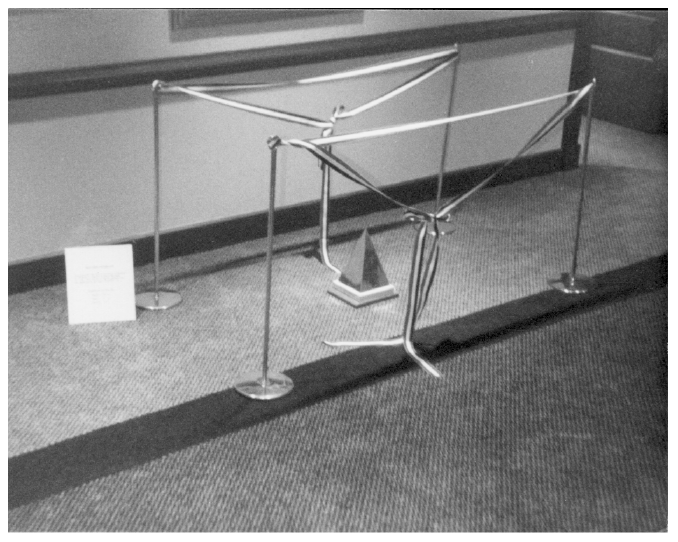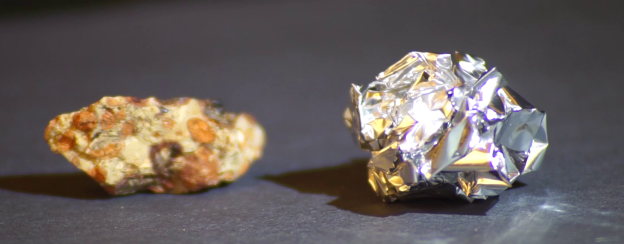This post is also available in video form: https://youtu.be/pXXad5FmkiU
Aluminum is wealth. That sounds strange – it’s cheap, and it’s a recent invention. But the fact that we can all get use (goods and services) because of things made of aluminum is a kind of wealth. And it’s an example of a bigger principle. When someone tells you something is rare or scarce and equates that to value, remember this. Value comes from enabling more people to enjoy something, not from preserving its exclusivity.
So where does aluminum come from, anyway? It’s a very abundant element. Lots of rocks contain aluminum. But making aluminum metal is tricky. It’s a very different process from iron and copper (for instance). Both of those, you find the ore, you cook it with carbon, just like with Minecraft (but more complicated), you get the metal. If you try that with aluminum, you get hot ore. None of the reactions produce metal.
At one point, aluminum was almost impossible to make. The top image is Bauxite from Saline [suh-LEEN] County, Arkansas. It’s basically dirt. With some very difficult and somewhat secret chemistry, in 1840, this could be converted into a metal that was literally priceless at the time. This was real life alchemy: base dirt, worth less than the cheapest metal, could be transformed into a substance rarer and more expensive than gold.
There’s a story, probably apocryphal, about Napoleon III. Somewhere around 1850, aluminum was rarer and more expensive than gold. Supposedly, the French Emperor wanted some especially honored guests to feel special. Their dinner was served with aluminum cutlery while the less special guests had to eat their dinner with common gold flatware.
In 1885, the capstone was placed on the brand new Washington Monument. It was a pyramid cast from aluminum. By then, aluminum was about the same price as silver.

(Photo The ribbon-cutting ceremony at Tiffany’s at their New York location on November 15, 1984. Via journal JOM, 47 (11) (1995), pp. 20-25. Public domain.)
Today, aluminum is so cheap is it disposable. For the price of an ounce of gold, you can have a literal metric ton of aluminum. Forget alchemy. Alchemy is for Dungeons and Dragons and Minecraft.
This is REAL power: it takes something cheap and useless and transforms it – not into something rare and expensive, but into something so useful that people can use it everywhere they can think of.
Aluminum is for leftovers and cans, but also for siding and wiring. We build airplanes out of it. The way you make aluminum is: grind up this bauxite ore, dissolve it in hot flux (a different molten rock). Then electricity is used to convert the aluminum oxide into metal. It takes a lot of electricity. That’s why Boeing is located in the Pacific Northwest: they used to make aluminum for Boeing planes using cheap Washington hydroelectricity.
Look at some of the cool things we can do with aluminum. Aluminum is strong and light, and it can be made into honeycomb panel. That material has an even higher strength-to-weight ratio than solid aluminum. This is great material for airplanes where every ounce of weight counts against fuel economy.
Aluminum can be machined, cast, and 3D printed for advanced manufacture of complex parts. It is lighter than other structural materials for so that electric cars can be lighter and get better range. Its light weight and corrosion resistance makes it perfect for solar panel assemblies so that they can go on lighter support structures and survive in remote locations.
Aluminum is super useful now, but it only got that way after we had the right knowledge and ability to scale way up. Capitalism did its job, and the government helped! They provided public land to place the dams, they provided loans, and public works to support and drive the industry.
Ubiquitous aluminum represents democratic wealth. We have the ability (yes, we, collectively) to create and use scientific knowledge, private enterprise, and government policy to make useless rock into a fundamental resource for industry and consumers. We came together to support human flourishing.
But consider the other option. What if Napoleon III had somehow managed to keep the methods to make aluminum secret? He might have wanted to keep the only source of a rare and valuable metal to himself. If he had managed to keep tight control over the supply and strictly limit production, he could have extracted the highest price for every ounce of metal he decided to produce. Aluminum might have remained like gold: rare, precious, and hoarded up in a vault. If aluminum metal had remained at gold prices, would be worth $82 million per ton. That’s feudal wealth – the ownership of something scarce.
In reality, aluminum sells for about $2,000 per ton, 40,000x cheaper than gold. It’s not scarce. Because of that, we have a material that we can use everywhere to make life better: cheaper transportation, recyclable containers, and every other application of a modern engineering material.
There are real examples of feudal wealth. Think of how companies work to preserve their monopolies on access to movies and music. Think of the monopoly on insulin. Consider oil. Right now, the few companies who own the oil rigs and the oil rights have an interest in the feudal kind of value. If something came along that drove down the price of oil – like cheap electricity and electric cars – then that would ruin their fortune. Cheaper transportation is better for everyone but the oil barons, and they have no reason to take it lying down.
Deliberately creating scarcity is the ugly temptation of feudal value. The owner of the Bauxite mine and the oil well stands to get more wealthy by creating LESS value. That’s called rent. It’s called passive income. And it should be a dirty word. The idea of the “free market” didn’t originally mean just “free from government.” It meant free from the rentiers.
Rent-seeking is the exact opposite of the kind of value that science creates.
Rent-seeking relies on authority; science only recognizes the authority of nature.
Rent-seeking relies on monopoly; science works best when knowledge is freely shared.
Rent-seeking is about scarcity; science is about knowledge, which is infinitely abundant.
There are ways to fight back against rent seekers: more education, more science, more unionization, and more enforcement of antitrust. Feudal rent seekers rely on monopoly control. If too many companies have oil wells and bauxite mines, then they can’t effectively create scarcity and have to compete. It’s not inherently anti-capitalist to recognize this. The purpose of the economy is to help make more goods available to more people, not to protect the divine rights of kings. Imagine if the scarcity of energy, medicine, cars, or houses went the way of aluminum.
It feels like things are getting harder for ordinary people. But we need to remember that we still have all of the accumulated knowledge of centuries! We have the power to make anything less scarce than it was 200 years ago. If things seem scarce, it is may be artificial. Energy isn’t scarce because we’re running out. It’s scarce because somebody has a toll booth on the easiest route to make it. It’s scarce because the toll booth owners want it to be scarce. As long as it stays scarce, their toll booths are profitable. Sometimes, I think I hear echoes of this idea in popular culture: ‘it’s rare and expensive so it must be hoarded and reserved for the deserving few.’ I don’t hold to that. When something is valuable because it is rare or scarce, it sounds like a scam to me.
P.S. I had a commenter who watched 30 seconds of this essay and said. “Wrong. Value is whatever people will pay for a thing.” That is a radical neoclassical assertion that I’m sure sounded like common sense to him. What about a dinner with friends? What about sex? Do those have only the value of what we pay for them?
Further Reading:
Aluminium Magazine article on advanced uses of aluminum: https://aluminiummagazine.com/mag/magazine/the-future-of-aluminium-advancements-and-innovations.html
The Point of a Monument: A History of the Aluminum Cap of the Washington Monument by George J. Binczewski. JOM, 47 (11) (1995), pp. 20-25. https://www.tms.org/pubs/journals/jom/9511/binczewski-9511.html
Aluminum’s Strange Journey From Precious Metal To Beer Can. NPR.org https://www.npr.org/2019/12/05/785099705/aluminums-strange-journey-from-precious-metal-to-beer-can

